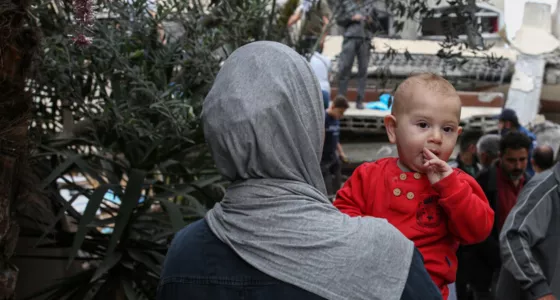The Association of International Development Agencies (AIDA) warns that the delivery of life-saving aid in Gaza is no longer feasible. Since the end of the brief truce on the 1st of December, the dramatic escalation of Israeli air and ground attacks on Southern Gaza has forced most humanitarian organisations to scale down their operations to the point that their actions are now statistically irrelevant when compared to the major critical needs of the 1.9 million internally displaced people, as reported by top UN official Martin Griffiths.
For two months, humanitarian organisations, including AIDA members, have worked in extreme conditions and danger to deliver life-saving aid in Gaza. Even before the end of the truce, the extreme restrictions imposed by Israeli authorities on the entry of food, water, fuel, and medicines in Gaza, coupled with the near impossibility of bringing in additional aid workers, have constantly prevented the development of any response of significant scale. The constant bombings, including of hospitals and aid facilities, claimed the lives of over a hundred humanitarian workers. Military operations and checkpoints have also prevented access to the north of the Gaza strip, and to several key localities in the Middle Area of the strip.
“Our teams have put their lives in the line for 2 months now, trying to deliver the little that was allowed through Rafah. But it has just become impossible with the intense bombing and thousands of new families arriving everyday in the south, where shelters are already hosting far more than their maximum capacity. We have reached a breaking point.” says Jason Lee, Chair of the AIDA Executive Committee and the Country Director of Save the Children.
With the escalation of Israeli military operations in the south, almost all humanitarian organisations are no longer able to reach their warehouses or to distribute food, water and other essential goods to the population outside of Rafah. Without any feasible major humanitarian operations, hunger, water scarcity, and a total collapse of the health care system are threatening to unleash disease epidemics that could kill or sicken many thousands of people, particularly children in the coming weeks. To prevent this, AIDA demands:
1. An immediate and comprehensive ceasefire.
2. We call upon Israel to remove its barriers to aid entry into Gaza and allow humanitarian agencies to operate with safety and protection from violence, as well as permit private sector commercial operations, as humanitarian agencies can never replace the private sector.
3. We call on the international community to increase their diplomatic efforts and invest their full political leverage so an even more catastrophic humanitarian crisis can be avoided or mitigated.
4. AIDA also calls on the world leaders to launch a multilateral process, aimed at ending the occupation, based on international resolutions and international law, granting the Palestinian people their internationally recognized right to self-determination.
“Two million people, including a million children are deprived of their most fundamental right to receive the aid they need to survive. The least we can do is to stop pretending they are receiving it and start asking for accountability”, Faris Arouri the Director of the Association of International Development Agencies – AIDA.
The Association of International Development Agencies - AIDA, is the main umbrella of international non-governmental organizations working in the occupied Palestinian territory (oPt). AIDA is a membership body and coordination forum representing more than 80 international non-governmental and non-profit organizations working in the occupied Palestinian territory (oPt) (https://www.aidajerusalem.org)
AIDA members’ mandates, focus areas of work and geographical orientation are highly diverse. Some are mainly humanitarian oriented, while others work to promote sustainable development through longer term program interventions. AIDA members work on an array of sectors including, but not limited to: humanitarian response, shelter, water, health, protection, gender rights, youth, agricultural development, resilience and disaster preparedness.
Established 1967, AIDA is one of the longest-standing INGO coordination fora in the world.

